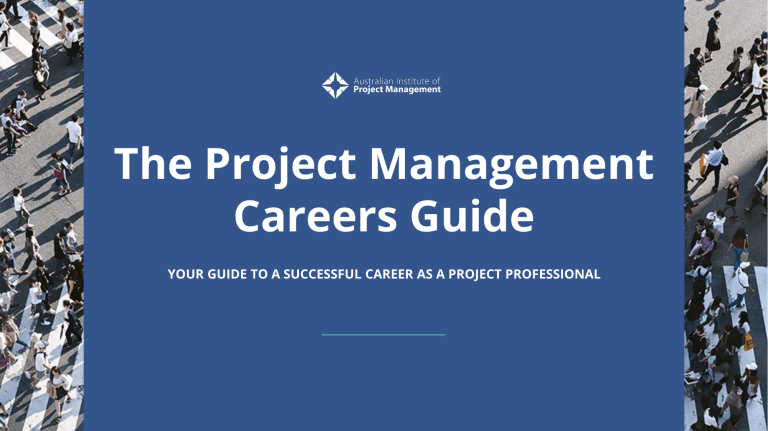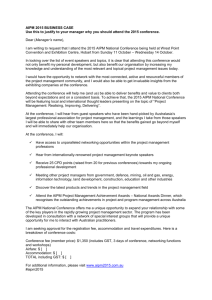
The Project Management Careers Guide YOUR GUIDE TO A SUCCESSFUL CAREER AS A PROJECT PROFESSIONAL CONTENTS 1 What is the role of a Project Manager? 2 How can I become a Project Manager? 3 What kind of salary does a Project Manager earn? 4 What is the typical career path of the Project Manager? 5 How can I advance my career to more senior roles? 6 How can I have a successful career in project management? 7 How can I stand out from the crowd when looking for a new role? A MESSAGE FROM THE AUSTRALIAN INSTITUTE OF PROJECT MANAGEMENT (AIPM) If you have a quick search of the employment market today, project, ensuring that costs are kept within budget, projects you will soon find numerous Project Manager jobs in just stay on track and are finished on time, and that the needs of about every industry you can think of. Project management stakeholders and team members are met. That is why the is becoming a lucrative career choice for many professionals AIPM advocates for competent Project Managers to be at the in Australia. helm of projects to ensure that all these requirements are met. What was once a role that was largely linked to the Construction and Infrastructure industries, Project So what exactly makes a great Project Manager and how can Managers can now be found in the public, private and not- you navigate a career in project management successfully? for-profit sectors across a range of industries including IT, In this eBook we will address these questions and more. We Health, Finance, Entertainment, Retail and Hospitality. will run you through everything from the skills needed to Project Managers are essential to the effective running of a succeed as a Project Manager today to the typical career path of the project management professional. Elizabeth Foley, CEO, Australian Institute of Project Management CHAPTER ONE WHAT IS THE ROLE OF A PROJECT MANAGER? At its core, the role of a Project Manager is to manage a project from start to finish. While this may sound quite simple in theory, the reality of being a Project Manager is far more complex and involves jumping through many hoops to get a project across the line. Project Managers focus on execution, staying within budget, delegating tasks, and completing deliverables. These are all key skills in being able to steer a project from beginning to end. As a Project Manager you should typically have the following traits: » Be a leader, who can communicate well with your colleagues, stakeholders and any other parties involved in the project. When a problem occurs, as the Project Manager you will be the first person that your stakeholders and team members turn to. They will be looking to you to address the problem and let them know what their role is in finding a solution. As a Project Manager it is your responsibility to motivate the team, keep them on track while making it a positive experience for everyone. » Be knowledgeable, and have the confidence and experience to effectively plan and manage the project. To be a great Project Manager you should have a clear understanding of the current best project management practices, methodologies and strategies for the planning and execution of a project. You should be continually upskilling and learning throughout your career to ensure you’re at the forefront of any changes impacting the project management profession and the industry you work in. There are many ways you can gain this type of knowledge, such as by undertaking undergraduate or post graduate study, becoming a member of an industry association like the AIPM, attending seminars and events, listening to online webinars and podcasts and subscribing to relevant magazines and newspapers. » Be adaptable, in the case that a project does not go to plan, as you will need to be able to manage any associated risks and lead the team and stakeholders through the tough period. While the role of project management can be extremely rewarding, it also comes with great responsibility as there is a lot of accountability attached to the job. That is why you will need to have the ability to adapt in the face of uncertainty – while you can plan and risk assess, there may be unforeseen problems that can arise throughout the project. You will need to have the strategies in place to shift or change your plans, so that you can keep the project on track, whilst remaining calm as the central person leading the project. CHAPTER TWO HOW CAN I BECOME A PROJECT MANAGER? As Project Managers play such a crucial role in the success of a project, it may take some time to get to the position of Project Manager. For many this will mean completing an undergraduate degree or certificate in project management or project administration. If you take the traditional path, once you have completed your studies you will start off in a project coordinator or administrator role and move up to the role of Project Manager, after you have spent several years learning the ropes. This may then lead you on to more senior positions such as Project Director or Program Manager. Getting your first role isn’t always easy, so consider supporting your CV by taking part in mentorship and internship programs. However, that is not the only path to the role of project manager, as for many they may end up managing projects more organically after completing nonrelated studies to project management. This has been coined the “accidental Project Manager”. If this sounds like you and you want to move your career in the direction of a Project Manager officially, then certifying the skills you currently have will be a good option. TIP: If you have already been directly accountable for the management of projects, then you could be eligible for AIPM’s Certified Practising Project Manager (CPPM). Click here to learn more > Resources for advancing your career in project management: » Visit our National Certification page to find out more about the different certification levels available and which one might be best suited to you. » Find out more about The AIPM Project Management Mentoring Program, which will match you with an industry leader who can provide you with advice and strategies for getting a job as a project manager in today’s climate. » Browse our Endorsed Courses, to see how you can upskill and gain entry to the project management space. CHAPTER THREE WHAT KIND OF SALARY DOES A PROJECT MANAGER EARN? Salaries for Project Managers differ depending on numerous factors from your experience, the industry, and the organisation. According to the Hays Salary Guide*: » Information Technology Project Managers earn between $102,000 to $150,000 and those with the title of Senior Project Manager bump up to $122,000 to $180,000. » Project Managers working in Resources and Mining earn in the range of $112,000 to $260,000 with similar salaries for their colleagues working in Oil and Gas of between $122,000 to $250,000. *information taken on 19 June 2020 » For the very specific project manager role for Rail Infrastructure, salaries range from $122,000 to $255,000. While specific to rail in this case, it’s presumably a good proxy for similar roles in other large-scale infrastructure projects (roads, dams, bridges etc). It's important to note that while these salaries are specific to the profession of project manager there are a range of junior and more senior roles that can see your salary differ to what is mentioned above. Read our Project Manager Salary blog for a more in depth look at what you might expect to earn in the project management industry at each stage of your career. CHAPTER FOUR WHAT IS THE TYPICAL CAREER PATH OF THE PROJECT MANAGER? The path of a Project Manager can vary depending on whether you have fallen into the role organically or you have studied project management specifically from the very beginning. Assuming the latter, here is the typical career path of the Project Manager: The Project Coordinator: The entry level point for many is the Project Coordinator or Administrator. Usually Project Coordinators report to the Project Manager to assist with administrative tasks on projects. It is their role to ensure the Project Manager and all team members have what they need to meet deadlines and milestones. The Project Manager: Once you have some Project Coordinator experience under your belt, it’s likely you will have most of the technical skills in place required to run projects and take on the role of Project Manager. Project Managers take the lead on a project and oversee everything from the project planning through to the completion of the project. The Project Director: As you take the next step up to Project Director the scope, challenge and responsibility of your new role can grow exponentially. At these levels, it’s no longer about the day to day execution of projects or perhaps even meeting deadlines, as top-notch project management skills will be expected here. The Project Director’s remit can cover highly complex, business critical and/or multiple projects. Of course, the career path of the Project Manager is not set in stone. For instance, your first role may be as an Estimator, you may then move to a Project Manager role and eventually decide that you would like to work as a Project Management Office (PMO) Manager. It’s about finding a career that you’re passionate about that will work for you. CHAPTER FIVE HOW CAN I ADVANCE MY CAREER TO MORE SENIOR ROLES? Once you have been managing projects for some time, you may wonder what the next steps are for you in your project management career. Generally, you will be looking at the roles of Senior Project Manager, Project Director and Program Manager. Any of these titles means that you are responsible for highly complex, business critical and/or multiple projects. These executive level roles can command large budgets and drive organisational transformation or strategically critical initiatives. “ To move up to these positions you will be required to show not only top-notch project management skills, but deep industry, if not organisational experience, as they tend to be more strategic and less about the execution of specific projects. To move up to these positions you will be required to show not only top-notch project management skills, but deep industry, if not organisational, experience as they tend to be more strategic and less about the execution of specific projects. A strong background in project management can set you up for any number of executive roles. If you have already been in the role of Project Manager for some time then you could look at supporting your experience through gaining certification, which will recognise your skills as a project manager. Depending on your experience you may be eligible for Certified Practising Project Manager (CPPM) or if you’re in a senior project manager role and manage difficult and high-risk projects Certified Practising Senior Project Manager (CPSPM). You can also look to undertaking post graduate studies, specific to project management. CHAPTER SIX HOW CAN I HAVE A SUCCESSFUL CAREER IN PROJECT MANAGEMENT? » Network with your peers: connect with other project management professionals through networking events and platforms like LinkedIn. » Keep a pulse on the latest best practices: Ensure you are up to date with the most recent project management practices, methodologies, and risk management techniques. » Use the latest software and online tools: Take advantage of improvements in technology which have digitalised many of the manual tasks, such as data reporting so that you can use your time effectively and on more important aspects of the project. Communicate often: Work on your communication and emotional intelligence as these are extremely important skills for the project professional when engaging with clients, stakeholders and team members. Learn from your mistakes: Mistakes happen and if they do ensure you pocket away the learnings. Consider what didn’t work and use that knowledge for ensuring future projects go smoother. Be an expert in your industry: Build your specialisation in your industry as this will help you take the next step and soon you will be the expert many call on for some of the most sought-after projects. CHAPTER SEVEN HOW CAN I STAND OUT FROM THE CROWD WHEN LOOKING FOR A NEW ROLE? Whether you’re new to the profession or looking to move on up, there are several things you should consider when starting your job hunt: » Look for jobs that match your experience. Be realistic when searching for a project manager role and only look at applying for positions that match your skillset. If you’re new to the industry or have only recently finished your undergraduate studies this may mean looking for roles such as project coordinator, administrator or planner. Alternatively if you have been managing projects directly for some time, even if you don’t have the title of project manager, you may be ready to take on a senior project manager role or even director role. » Choose an industry you’re passionate about. As there are » Back up your skills with certification and training. While so many industries that are now home to project on the job experience goes a long way, supporting it manager roles, take a moment to think about which through being recognised for your project management industry will suit your skillset best. This will help you knowledge and skillset will take your CV up a notch. when it comes time to apply for more senior roles as There are many courses available online and AIPM offers often hiring managers look for specialists in their five levels of certification that will recognise your current industries for Senior Project Manager, Project Director or skillset as a project professional. Program Manager roles. Get the tools, events, resources and more to advance your career, grow your network and improve your project management and leadership skills with AIPM ✓ Access to Australia's largest online community for project managers ✓ Certification and industry recognition, including a pathway to chartered status ✓ Innovative events to keep you growing as a project professional ✓ Advocacy for you and fellow project managers ✓ Leadership courses to help you advance your career ✓ Mentoring program CHECK OUT AIPM MEMBERSHIP

